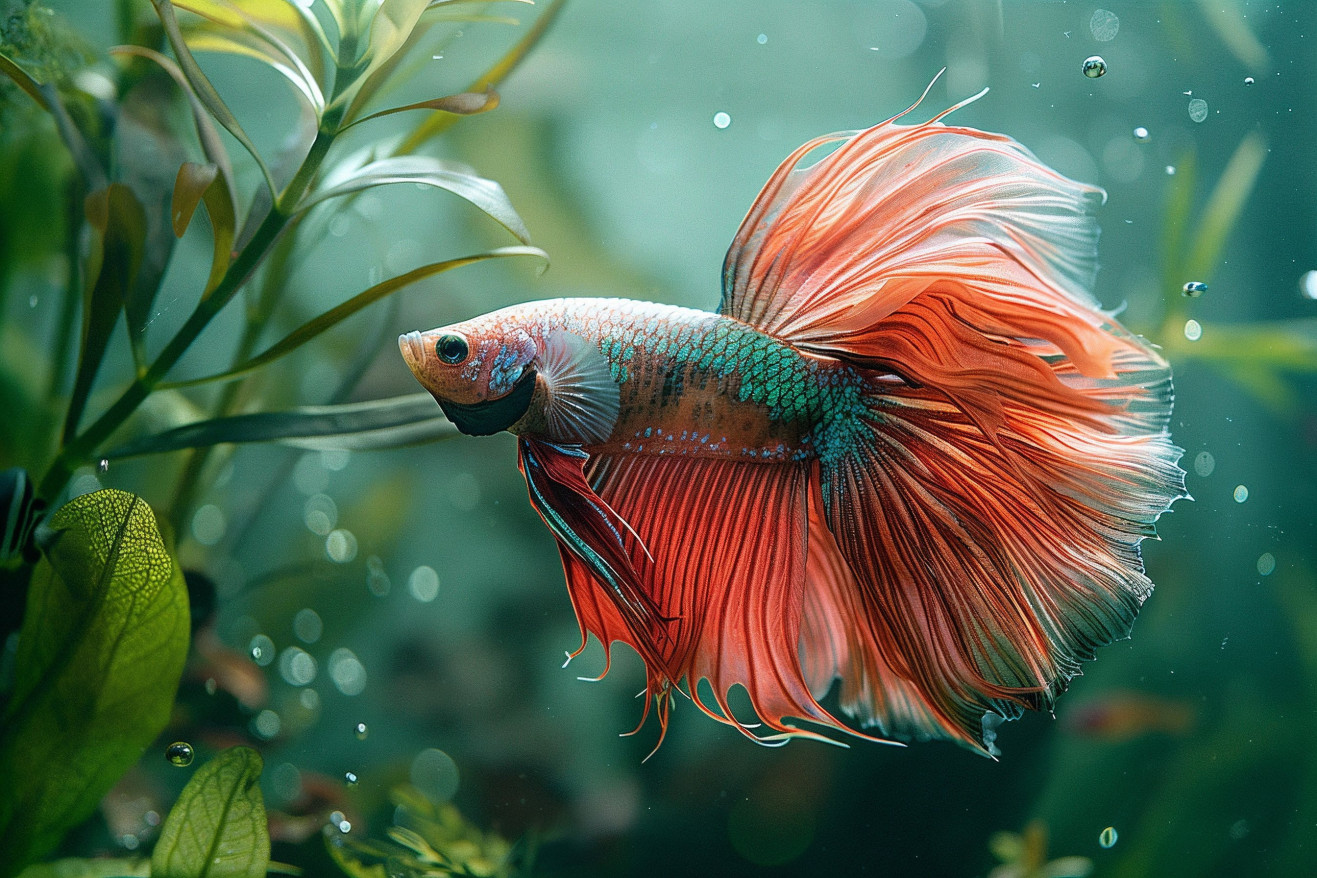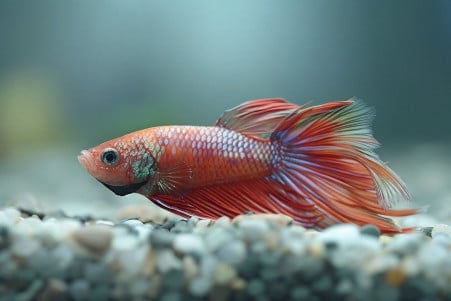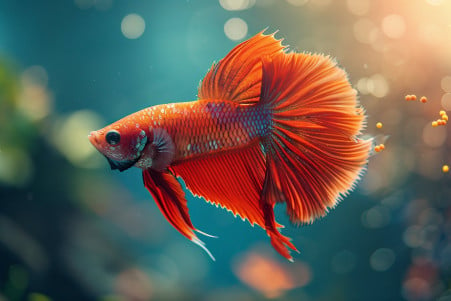Why Did My Betta Fish Die? Top Causes and Prevention Tips
6 June 2024 • Updated 5 June 2024

Betta fish are popular pets for good reason, but unfortunately, there are a number of common causes that can lead to the sudden loss of these colorful fish. From water quality issues and temperature changes to overfeeding and common diseases, bettas have specific needs that need to be met. Failing to meet these needs is often the reason behind the sudden death of a betta fish.
To help you understand what may have gone wrong in your tank, we'll cover the most common environmental factors, diseases, and care mistakes that can lead to the death of a betta fish. Based on information from reputable sources and research from the aquarium community, this article is designed to give you the information you need to make sure your next betta fish has the best chance of living a long, healthy life in your care.
What are the top causes for a betta fish dying?
Keeping the Water Clean: The Most Important Factor in Betta Fish Care
Poor water quality is the leading cause of disease and early death in betta fish. As stated by Bettafish.org, bettas need a cycled tank with 0 ppm of ammonia and nitrites and a pH level that is slightly acidic, ranging from 6.5 to 7.5. High levels of ammonia, nitrite, and nitrate due to waste buildup can become toxic quickly.
To prevent this, PetMD suggests changing out 10-25% of the water every 2-4 weeks for tanks that are 5 gallons or smaller, and more often if necessary. Tanks that are 5 gallons or larger are generally more stable but still need to have 25% of the water changed out weekly and a full water change monthly.
It's also important to keep the water within the temperature range of 76-81°F, which usually means using an aquarium heater unless the room temperature is consistently above 78°F. A good dechlorinator should be used, and water should be tested regularly with an aquarium test kit so that the water's chemistry can be adjusted as needed.
While tanks that are smaller than 3 gallons require more frequent water changes and more attention to detail, PetSmart notes that it's important to keep the water clean and healthy for bettas in all tank sizes. Dirty water will lower a betta's immune system, leading to stress, disease, and eventually death if it's not addressed. Making sure that your betta is in a cycled tank and keeping up with water changes is essential to ensuring that your betta fish lives a long and healthy life.
Ensuring the Right Habitat: Tank Setup and Enrichment
Bettas need a tank that is at least 2.5 gallons, although Bettafish.org suggests that 5 gallons or more is best for the fish's health and longevity. The tank should be equipped with a filter, heater, and plenty of hiding spots and live or silk plants for enrichment. PetSmart also notes that proper lighting and a consistent day/night cycle are important for betta health and behavior.
Decorations and tank mates need to be chosen carefully to make sure that they don't stress or harm the betta. As Buce Plant explains, inert rocks, soft plants, and a cave-like structure can help make the environment feel safe and secure. It's also important to make sure that the tank is set up properly from the beginning, as an inadequate environment can lead to a number of health problems for these delicate fish.
Acclimation and Transitioning Betta Fish: Why It Matters
Acclimating a new betta to its tank is important because it helps to reduce stress and the risk of shock, according to Bettaboxx. The acclimation process includes floating the betta's bag and adding tank water to the bag over a 25-30 minute period. This way, the betta can get used to the changes in temperature, pH, and mineral levels in the water, all of which can be deadly if they happen too quickly, according to wikiHow.
Bettafish.org suggests that new bettas be quarantined for 2-4 weeks before they're introduced to a community tank. This way, you can make sure that any diseases or parasites that the betta may have been exposed to before you brought them home can be treated. It's also important to keep a close eye on the betta after they've been introduced to their new tank and make sure that they aren't showing any signs of stress, like clamped fins or a loss of color.
Acclimation and quarantine are important because they help ensure that the betta's system isn't shocked, which can lead to illness or even death. By taking the time to make sure that a new betta is introduced to their new environment as smoothly as possible, you can help ensure that they live a long, healthy life.
How to Spot and Treat Common Betta Diseases
If their tank conditions aren’t properly maintained, betta fish can fall victim to a number of bacterial, fungal, and parasitic diseases. Bettafish.org lists some of the most common diseases as fin rot, columnaris, ich, velvet, and dropsy, all of which have different symptoms that need to be identified and treated as quickly as possible.
For instance, fin rot is easily identified by the red or black tattered edges that appear on the fins. If not treated, this can lead to body rot. Fishlab.com notes that columnaris, which is also known as “cotton wool” disease, is characterized by white or grayish patches on the head, body, or gills and can be fatal if it’s not treated right away.
Early detection and the right medications are key to helping your betta fish survive, and wikiHow provides a list of symptoms and treatments for some of the most common betta fish diseases. In addition to this, keeping the water in the tank clean and quarantining new fish can help prevent diseases from popping up in the first place. It’s also a good idea to keep a betta fish first aid kit on hand so you can quickly address any health issues that arise.
Emergency First Aid and Life-Saving Techniques
In emergency situations, having a well-stocked betta first aid kit can be critical, according to Aquarium First Aid. The kit should include medications, water conditioners, a quarantine tank, and other essential supplies, as described in the article Betta Fish First Aid Kit for Quick Health Care.
It's also important to know how to respond to chemical spills, fish injuries, or sudden illness. This knowledge can help you save your betta's life. wikiHow suggests using non-invasive life-saving techniques, such as adjusting the temperature of the water and giving your fish salt baths, to help your betta recover from distress. That said, it's important to consult a veterinarian if your betta doesn't respond to these first aid techniques.
By making sure you have the right supplies and learning how to respond to emergencies, you can ensure that you're ready to help your betta if it ever needs life-saving care.
Conclusion: How to Help Your Betta Fish Live a Long, Healthy Life
Betta fish have specific needs that must be met to prevent them from dying prematurely. It's important to make sure that you maintain a clean tank by setting it up properly and keeping up with regular maintenance. You should also make sure that you provide an enriched environment, feed your betta the right diet, and keep an eye out for signs of illness.
In case of an emergency, you can be prepared by having a first aid kit on hand and learning how to perform revival techniques. With the right care, bettas can live long, healthy lives as pets.


